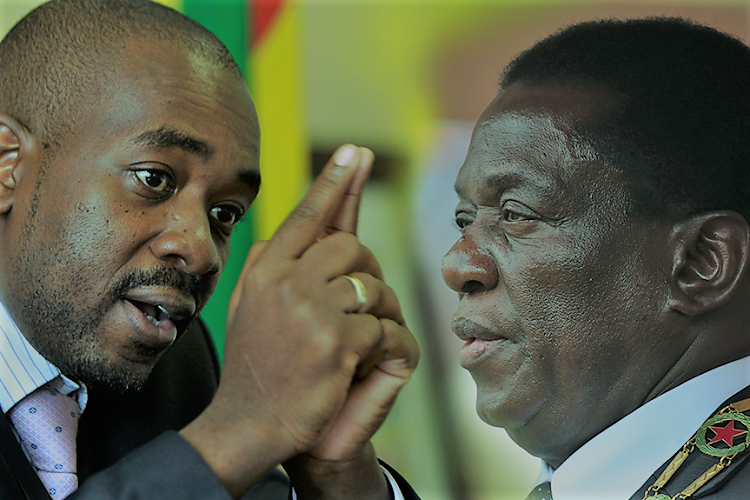
PROTRACTED outcries over the ‘abuse’ of judicial institutions against opposition political parties during the run-up to next week’s general elections will likely plunge Zimbabwe into a post-election crisis, analysts warned this week.
President Emmerson Mnangagwa locks horns with closest rival Nelson Chamisa, leader of the opposition Citizens Coalition for Change (CCC) as he fights to secure a second term in the polls set for August 23.
But the run-up to the election was overshadowed by allegations that Zimbabwe’s ruling Zanu PF leveraged on its incumbency to ‘deliberately disqualify’ opponents — a ‘law fare’ that many say is likely to haunt the country in the years ahead.
Lawfare is defined as the misuse of legal systems and principles against an opponent to damage or delegitimise them.
It is a tactic used by repressive governments to label and discourage civil society or individuals from claiming legal rights via national or international legal systems.
Those that have fallen by the wayside during the pre-election period, replete with unprecedented legal actions, include Zanu PF’s exiled former political commissar, Saviour Kasukuwere, who attempted to challenge Mnangagwa for the presidency, before being disqualified following a string of court applications.
This year’s polls witnessed the highest number of pre-election legal actions in Zimbabwe’s 43 year old history.
Some of the cases were brought to the courts during the final weeks of the campaign period, as opposition candidates challenged the Zimbabwe Electoral Commission (Zec)’s decisions, along with those made by the courts.
- Young vocalist making southern Africa dance
- Business opinion: Branding in the age of entrepreneurship and industrialisation (Part 6)
- Business opinion: Branding in the age of entrepreneurship and industrialisation (Part 6)
- Mr President, you missed the opportunity to be the veritable voice of conscience
Keep Reading
A highlight of the battles include the July High Court decision disqualifying 12 CCC House of Assembly candidates, who were disqualified after a Zanu PF activist approached the courts arguing that they filed their nomination papers after the prescribed time on June 21.
The judgment was overturned by the Constitutional Court, only three weeks before elections.
Experts said even if the decision came in their favour, their campaigns were affected.
They see Zimbabwe’s opposition potentially mounting post-election legal actions should some of its candidates lose, citing lost campaign time as a result of the challenges.
On July 19, Elisabeth Valerio, president of the opposition United Zimbabwe Alliance, the only female presidential candidate taking part in the polls, also took to the courts after her nomination papers were rejected by Zec for submitting a partial bank proof showing that the US$20 000 nomination fee had been paid.
Valerio won the right to contest.
On July 26, the High Court dismissed with costs an application by Linda Masarira, another presidential candidate, who also challenged Zec’s rejection of her nomination papers.
The High Court ruled that Masarira could not take part in the elections after she failed to pay the nomination fee.
But she fired back, arguing delays in processing her nomination fees were not of her making as she was a victim of the currency chaos roiling Zimbabwe.
In another dramatic turn of events, MDC-T leader Douglas Mwonzora last week withdrew from the presidential race, after describing the polls as a ‘farce’.
As lawsuits mounted in Zimbabwe’s courts, fears swelled that next Wednesday’s polls faced the threat of postponement.
But the courts cleared the cases to pave way for ballot paper printing.
Commenting of the disqualifications, Musa Kika, a human rights lawyer said authorities used Zec, and the courts, to ignore the tenants of democracy.
“The courts are being used, together with Zec, to subvert the true import of electoral democracy,” Kika told the Zimbabwe Independent.
“The elections become discredited even before the polling happens. I must also say that the unusual amount of litigation is enough evidence that there is a problem with election management in this country. Our institutions cannot be trusted,” Kika said.
Kasukuwere, an independent candidate, who was also a cabinet minister in the late former president Robert Mugabe’s government, lost his right to participate in the polls after the courts said he had been out of Zimbabwe for over 18 months.
The ruling was in terms of section 91 of the Constitution.
“The 2023 elections have other blots. These include the deliberate ploy not to hand over the electronic voters roll to stakeholders by Zec,” Paidamoyo Muzulu, a columnist for NewsDay, said.
“We are aware from the 2018 general elections that Zanu PF had a database of voters’ information. Most people received unsolicited text messages canvassing for votes from Zanu PF on their mobile phones,” he said.
“The mystery has not been solved, but it is very clear that the source is the voters roll.”
Civic society organisations were also worried that Zanu PF was abusing state resources in the run-up to the polls.
Freedom Alliance spokesperson Nhlanhla Ncube said the abuse of coaches from the state-run Zimbabwe United Passenger Company was worrying.
“There has been continued abuse of State resources since independence and parastatals like Zupco have collapsed," Ncube said.
“In the same vein, it is inconceivable to see the ruling party having run down State institutions and the economy, providing truckloads of food and beverages at their rallies, while the social welfare ministry has no resources,” he said.






